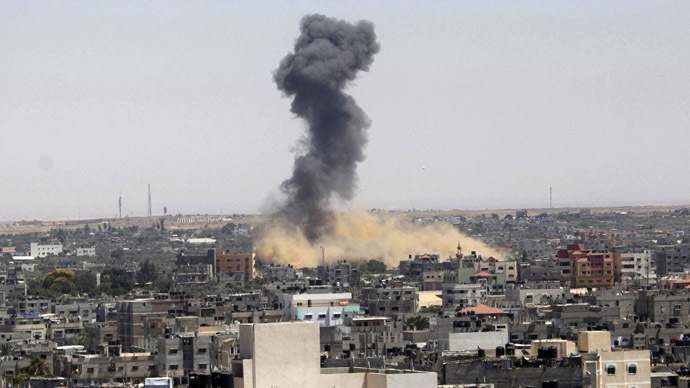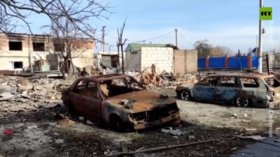Palestinians subjected to apartheid treatment

At the moment, the world is watching in horror as Israel is conducting the latest stage in its seemingly endless and relentless campaign of extermination aimed at the population of the Gaza strip.
That little piece of land (counting a grand total of 360 km² or a landmass smaller than the tiny Isle of Man possessing a whopping 572 km²) has been turned into an "open air prison" for 1.657 million Palestinians unable to leave or hide. The majority of the mainstream media across the globe, in contrast, appears willfully unaware of the actual circumstances on the ground and publicly supports Israel's "right to defend itself".
Originally, the 1947 United Nations Partition Plan assigned Gaza to the Arab Palestinian state, but in the course of the 1948 Arab-Israeli War Egypt occupied Gaza City and on 22 September 1948 the Arab League (with the exception of Jordan) recognized the All-Palestine Government set up in the Egyptian-controlled Gaza Strip. As a result, Arab states were then in a position to wash their hands of any kind of responsibility or involvement and abandoned the Palestinians to face the Israelis on their own. Even though since then many things have changed and many Arab-Israeli battles have been fought, most notably the 1967 war that changed everything, and also brought the Americans into the fray, today Arab nations persist in this lackadaisical attitude of leaving the Palestinians to their own devices.
As such, even the Jerusalem Post's Ariel Ben Solomon remarked
upon this surprisingly unsurprising fact, declaring that
"Arab newspapers are still giving top coverage to the
conflict [in Gaza], but it is not appearing to be dominating the
news", as if the World Cup in Brazil (which came to an end
last Sunday) were a matter of greater interest. Solomon even
disclosed that the "Jordanian Ad-Doustour newspaper, wrote
that it is completely clear that many of the countries in the
region are waiting for this round of fighting to stop in order to
resume their usual issues as though nothing happened.”
The picture that thus emerges shows us that only the Shi'ite
state of Iran is now effectively lending the Palestinians a
helping hand, Mohammadi Araqi the Deputy Head of the Iranian Red
Crescent Society, declaring that the "Iranian Red Crescent
Society is prepared to help the Palestinians through sending
medical and welfare aid".
At the same time, Turkey, another non-Arab yet a staunchly Sunni nation in the region, has announced that it will send foodstuffs and other urgent aid material worth $1 million in support of the Palestinians in Gaza. Turkey's Prime Minister, the incredibly popular yet equally divisive Recep Tayyip Erdogan personally gave the orders to Turkey's Cooperation and Coordination Office. Ever since his "One Minute" stunt at Davos in 2009, Erdogan very much likes to portray himself as Palestine's best and only friend in the region. It therefore should come as no surprise that the internet was abuzz with news that Khaled Meshal had secretly visited Ankara at the beginning of this month to secure Turkish support against an Israeli attack. These rumors have since been denied, but that Erdogan's AKP is sympathetic to Hamas, as an outgrowth of the Muslim Brotherhood, is a well-known fact.

In this context, the Washington-based foundation for Defense of Democracies released a report on Terrorism Finance in Turkey a few months ago, even appending the ominous subtitle A Growing Concern. Its author Jonathan Schanzer, a prolific scholar in Middle Eastern studies, does not mince his words, accusing Turkey of trying to "integrate Hamas ... into what appeared to be the new regional order" – a design that went bankrupt after the fall of Mohammad Morsi in Abdel Fattah el-Sisi's "coup-that-wasn't-a-coup" last summer.
Even though Schanzer's case appears flimsy at best, the report nevertheless concludes that Turkey's AKP government is a major source of income for the Palestinian resistance movement (the acronym Hamas stands for Ḥarakat al-Muqāwamah al-ʾIslāmiyyah or 'Islamic Resistance Movement'), which is all but a statement of fact. A fact that really does not constitute any great concern as Hamas is not designated as a terrorist organization by either the UN or Turkey. Hamas is after all a multi-layered organization, comprising three separate wings: one responsible for social welfare, another for political action, and finally also a specifically military section, the Izz ad-Din al-Qassam Brigades, formed in 1992 and arguably responsible for Hamas' terrorist label in the US (granted by the overly hawkish Madeleine Albright's State Department in 1997, "in accordance with section 219 of the Immigration and Nationality Act (INA))".
Even though Hamas is now part of the Palestinian unity government, abiding by the conditions stipulated by the EU and the US, Israel persists in vilifying the organization as a terrorist network bent on the destruction of Israel. In spite of the fact that the current Israeli onslaught came in response to the killing of three hapless Jewish teenagers, the official rhetoric as well as the mainstream media's focus has now turned to the rockets launched from Gaza. Benjamin Netanyahu and various members of his government refer to these "primitive rocket attacks", using the ever-outspoken Norman Finkelstein's words, as providing the real reason for Israel's asymmetrical offensive on multiple targets in the Gaza strip: Israeli missiles do hit civilian targets, killing and wounding numerous Palestinians in the process: while rockets from Gaza either get intercepted by Israel's Iron Dome (an "effective, truck-towed mobile air defense system developed by Rafael Advanced Defence Systems") or merely land on empty plots of land, killing and wounding no-one as a result. In other words, the legitimate self-defense argument seems more than spurious, as the Iron Dome system appears more than well-suited to emasculate Palestinian projectiles.
Lately some voices have emerged indicating that the recently discovered hydrocarbon reserves off the Gaza coast constitute a better explanation for Bibi's currently inflamed belligerence. As worded by ever-eloquent Pepe Escobar, this is what constitutes the "[b]igger [and largely unseen] [p]icture - the 122 trillion cubic feet of gas plus the potential 1.6 billion barrels of oil in the Levant Basin spread over the territorial waters of Israel, Syria, Lebanon, Cyprus and – of course – Gaza". After all, as I wrote earlier it has always been about the oil, quoting Professor Michael Schwartz paraphrasing Bill Clinton's speech-writer James Carville.

Last year, this discovery led to a renewed commercial entente between Israel and Turkey, allowing the Turkish conglomerate Zorlu Energy to seek a "15-year contract for 3 billion cubic meters of natural gas annually as part of a hoped-for $2.5 billion pipeline project running underwater from the Leviathan field to Turkey". And this much-vaunted "Leviathan field [is] located approximately 80 miles off the coast of Israel and situated in water that is more than 5,000 feet deep — which holds 18 Tcf [or Trillion Cubic Feet] in estimated recoverable resources,” as noted by the US Energy Information Administration (EIA).
With regard to the current Israeli operation, significantly having received the name Operation Protective Edge, there are the Marine-1 and Marine-2 gas wells, inside the Leviathan field and off the Gaza coast. The Geneva-based Anais Antreasyan rightly points out in the University of California's Journal of Palestine Studies that Israel's long-term goal is "to integrate the gas fields off Gaza into the adjacent Israeli offshore installations". But, as the international security journalist and academic Dr. Nafeez Ahmed appropriately underlines, the "Israel-Palestine conflict is clearly not all about resources. But in an age of expensive energy, competition to dominate regional fossil fuels is increasingly influencing the critical decisions that can inflame war". So that, on Tuesday, 15 July, Bibi signaled his willingness to accept an Egypt-proposed cease-fire aimed at ending the week-long deadly onslaught. The Israeli Security Cabinet even accepted the offer, which was immediately rejected by Hamas.
Through the efforts of the Zorlu Energy conglomerate Turkey is also somewhat privy to this partial energy war, as would befit a wily pseudo-Ottoman trader always trying to maximize profits while weighing the risks. Last April, for instance, Zorlu even acquired a 25% stake in an 840 MW capacity combined cycle power station based on natural gas in Ashkelon - "Israel’s largest private power plant" built by the Israeli firm Dorad Energy Ltd. As reported by Sharon Udasin, the "company will be selling all of its power output directly to private companies and government agencies, such as the Defense Ministry, Mekorot, Israel Aerospace Industries, Fattal Hotels, Keter Plastics, Isrotel, Strauss, Osem, Tamares Hotels, the Cargal Group, Seven Stars Mall, Bank Leumi and Tnuva".
The wily Turks are not just dealing with Israel for energy and profits, its immediate neighbors Iraq, the KRG and Syria are also within its pseudo-Ottoman reach. As reported by Hurriyet Daily News' Sevil Erkus from Ankara, "KRG President Masoud Barzani was in Ankara [on Monday, 14 July] for talks with Turkish President Abdullah Gul, Prime Minister Recep Tayyip Erdogan and Foreign Minister Ahmet Davutoglu, amid the ongoing regional crisis due to growing jihadist activity. Barzani was also motivated to find a formula to receive revenues from the sale of northern Iraqi oil".
Now that the Islamic State (or the terrorist organization formerly known as ISIS) has succeeded in dividing the lands of Mesopotamia, known as Iraq since the end of World War I (1918), after having secured the end of Syria's lucrative oil trade that secured the flow of some 400,000 barrels per day previously providing Bashar al-Assad with a major source of income, regional players are once again focusing on the land that "swims on a sea of oil". And the KRG, as the temporary winner in the armed contest with the Islamic State, is now capitalizing by means of profitable deals with its northern neighbor of Turkey and its somewhat long-standing yet fairly removed ally of Israel. In this way, the Kurds, the Turks, and the Israelis seem intimately interlinked through their network of energy sales and profits, leaving the hapless Palestinians out in the cold and subject to veritable apartheid treatment and a rain of IDF bombs.
The statements, views and opinions expressed in this column are solely those of the author and do not necessarily represent those of RT.
The statements, views and opinions expressed in this column are solely those of the author and do not necessarily represent those of RT.














